- Home
- Jack Kerouac
Maggie Cassidy Page 7
Maggie Cassidy Read online
Page 7
“Aw,” said my father looking up with frank stunned eyes, very blue eyes, “it’s my first night home, you said we’d go bowling—We’ll choose sides with the boys—”
“Zeet? Me and your Pop against you and Iddyboy!” cried Lousy in eager glee squeezing himself, then, to me, low, looking over his shoulder, for the benefit of everybody, “Maggie Cassidy that was? Ah Zagg you Babe that aint right cheatin on Pauline Cole! Hee hee! Hey Mister Duluoz we call Jack Zagg-you-Babe now—Hear that,” grabbing me by the neck and making a frown, “now he’s cheatin on Moe Cole—Let’s drown him in the water, throw him in the snow—”
“Eeedyboy!” echoed Iddyboy with shining eyes showing me his huge fist. “I going to fix you Jack and knock you through the fence!” We made wrestler faces at each other.
Impatiently my mother: “Stay here, stay home Jean—”
Rubbing his hands wirily Billy Artaud: “He knows when he’s beat! Doesnt wanta accept that challenge bowling—Let him go!” he finally yelled above all the others triumphantly as a commotion in the kitchen rose making little spiderwebs of the corner ceiling wave. “That leaves four of us, we’ll have a bowling party—and Missiz Duluoz can keep the score!”
This raised roars of noise and laughing. I had a chance to go. All in life, prime, youngjoy days, riches of sixteen, I sneaked off to the lazy unresponsive girl three miles across town by the tragic-flowing dark sad Concord.
I took the bus—at the last minute avoiding my father’s eyes—telling myself “I’ll see him tomorrow for gosh sakes—” Ride the bus, guiltish, depressed, looking down, always the dross and dirty loss spine ribbing down life’s poor gold and it so short and sweet.
It was a Monday night.
15
From Pawtucketville to South Lowell the route by bus encompassed the city—down Moody, to Kearney Square below the high school, the fleet of buses, the people huddled waiting against doorfronts of soda parlors, 5 & 10s, drugstores—The sad traffic crunching in from winter, out to winter—The bleak blue raw feel of the wind from the woods cityfying by the few sad lights—There I changed to the South Lowell bus—It would show up always catching at my throat—the mere name of it as the busdriver’d rolled it in the window enough to make my heart beat—I’d look at other people’s faces to see if they saw the magic—The ride itself grew grimmer—From the Square out up Central, to Back Central, to the outlying dark long streets of the town where dim frost sits the night by howling-wind garbage pails in cold moonlight—Out along the Concord where factories enlisted its famous flow—out beyond even them—to a dark highway where Massachusetts Street under a brown dumb streetlamp spoked in, small, mean, old, full of my love and the name of it—There I’d get off the bus, among trees, by the river, and dodge the mudholes, seven cottages down on the right to her rambling old unfenced brown-windowed house overtopped by clacking skeletal trees of the sudden from-Boston sea winds blown over wilderness, railyards and hoar—Each house meant my heart beat faster as it passed my rapid step. Her actual house, the actual light that actually upon her was bestowing and around her bathing, mote by mote made rare gold, dear magic, was the commotion hysterical light of wonder—Shadows on her porch? Voices in the street, in the yard? Not a sound, but the dull Victorian wind moaning New England by the river in the winter night—I’d stop in the street outside her house. One figure within—her mother—gloomy pawing in the kitchen, turning sadly in life, putting away her sweet dishes that some day they’d pack away with guilt and sorrow and say “I never knew, I never knew!”—The dumb, the spittling mankind crawing in his groin to make nothing.
Where is Maggie? O wind, songs have ye in her name? Plucked her did ye from midnight blasted millyard winds and made her renown ring in stone and brick and ice? Hard implacable bridges of iron cross her milk of brows? God bent from his steel arc welded her a hammer of honey and of balm?
The rutted mud of hardrock Time . . . was it wetted, springified, greened, blossomied for me to grow in nameless bloodied lutey naming of her? Wood on cold trees would her coffin bare? Keys of stone rippled by icy streaks would ope my needy warm interiors and make her eat the soft sin of me? No iron bend or melt to make my rocky travail ease—I was all alone, my fate was banged behind an iron door, I’d come like butter looking for Hot Metals to love, I’d raise my feeble orgone bones and let them be rove and split the half and goop the big sad eyes to see it and say nothing. The laurel wreath is made of iron, and thorns of nails; acid spit, impossible mountains, and incomprehensible satires of blank humanity—congeal, cark, sink and seal my blood—
“There you are. What are you standing out in the road for? What’d ya come for?”
“Didnt we decide on the phone?”
“Oh . . . maybe you did.”
This made me mad and I didnt say anything; now she was in her element.
“What are you so quiet about, Jacky Boy?”
“You oughta know. Dont call me Jacky Boy. Why were you on the porch. I didnt see you!”
“I saw you com in down the street. All the way from the bus.”
“It’s cold out.”
“I’m wrapped in my coat snug. Come on in with me.”
“In your coat.”
Laugh. “Silly. In the house. Nobody home. My mother’s goin to Mrs. O’Garra tonight to hear the Firestone Hour, some singer.”
“I though you didnt want me to come. Now you’re glad.”
“How do y’know?”
“When you squeeze my hand like that.”
“Sometimes you get me. Sometimes I cant stand how I love you.”
“Hah?”
“Jacky!” And she was on me, all of her, thrown socko into me all huddled to my frame, clung, kissing me wild and deep and hot—desperate—it would never have happened on a regular Wednesday or Saturday night planned date—I closed my eyes, felt faint, lost, heartbroken, salt-sunk drowned.
In my ear, warm, hot lips, whisperings, “I love you Jacky. Why do you make me so mad! Oh you make me so mad! Oh I love you so! Oh I wanta kiss you! Oh you damn fool I want you to take me. I’m yours dont you know?—all, all yours—you’re a fool Jacky—Oh poor Jacky—Oh kiss me—hard—save me!—I need you!” Not even inside the house yet. In there, by the hissing radiator, on the couch, we practically did everything there is to do but I never touched her in the prime focal points, previous trembling places, breasts, the moist star of her thighs, even her legs—I avoided it to please her—Her body was like fire, packed soft and round in a soft dress, young—firm-soft, rich—a big mistake—her lips burned all over my face. We didnt know where we were, what to do. And dark moved the Concord in the winter night.
“I’m glad I came!” I told myself jubilantly. “If Pa could see this or feel this he’d know now, he wouldnt be disappointed—Lousy too!—Ma!—I’m gonna marry Maggie, I’m gonna tell Ma!”—I pulled her yielding yearning waist, it popped her pelvis bone right into mine, I gritted my teeth in the memory of the future—
“I’m goin to the Rex Saturday night,” she said, pouting in the dark as I licked her lower lip with my fingertip then threw my hand on the floor off the couch and she was suddenly stroking my profile. (“You look like you’re cut out of rock.”)
“I’ll meet you there.”
“I wish you were older.”
“Why?”
“You’d know more what to do with me—”
“If—”
“No! You dont know how. I love you too much. What’s the use? Oh hell—I love you so! But I hate you! Oh go home!! Kiss me! Lie on top of me, crush me—” Kisses—“Jacky I wrote you a big note today and tore it up—too much in it—”
“I read the one—”
“I finally sent that one—I wanted you to marry me in my first note—I know you’re too young, I’m robbing the high school cradle.”
“Ah—”
“You have no trade—You have a career ahead of you—”
“No no—”
“—be a brakeman on the railroad, we’ll live in a little house by the tracks, play the 920 Club, have babies—I’ll paint my kitchen chairs red—I’ll paint the walls of our bedroom deep dark green or sumpin—I’ll kiss you to wake up in the morning—”
“Oh Maggie that’s what I want!” (Maggie Cassidy? I thought wildly. Maggie Cassidy! Maggie Cassidy!)
“No!” Slapping me on the face—pushing it—angry, pouting, rolling away, sitting up to roundabout her dress again straight. “Hear me? No!”
I’d wrestle her to the bottom of the dark couch retwisting her dresses slips belts and girdly toot pots both of us panting, sweating, burning—Hours passed, it was midnight, my day was not done—Reverently my hair was falling in her eyes.
“Oh Jack it’s too late.”
“I dont wanta go.”
“You gotta go.”
“Ah okay.”
“I dont want you to go—I love you to kiss me—Dont let that Pauline Cole steal you away from me. Dont make faces like that I’ll get up and walk away—Jacky—I love you I love I love you—” She kept saying it into my mouth—through my teeth, bit my lip—There were tears of joy in her eyes, on her cheeks; her warm body smelled ambrosial brew in the profound struggle we waged sinking in pillows, bliss, madness, night—hours on end—
“You better go home, dear—You gotta go to school tomorrer—You’ll never get up.”
“Okay Maggie.”
“Say you love me when you wake up in the morning, to yourself—”
“How could I . . . otherwise . . . do . . .”
“Call me tomorrer night—come Friday—”
“W—”
“I mean Wednesday! Kiss me! Hold me! I love you I always will and no one else ever ever—I never was so much in love—never again—you damn Canook you—”
“I cant leave.”
“Leave. Dont let nobody tell you nothin about me.”
“Nobody does!”
“If they do . . .
“If they did I wouldnt lissen—Maggie that house by the railroad tracks, the red chairs . . . I . . . I . . . cant—dont want to do anything else with anybody else—ever—I’ll tell—I’ll—we’ll—Ah Maggie.”
She’d cradle my broken head in her all-healing lap that beat like a heart; my eyes hot would feel the soothe fingertips of cool, the joy, the stroke and barely-touch, the feminine sweet lost bemused inward-biting far-thinking deep earth river-mad April caress—the brooding river in her unfathomable springtime thoughts—The dark flowing enriched silty heart—Irish as peat, dark as Kilkenny night, sorcerous as elf, red-lipped as red-rubied morn on the Irish Sea on the east coast as I have seen it, promising as the thatched roofs and green swards there bringing tears to my eyes to be an Irishman too and lost and sunk inside her forever—her brother, husband, lover, raper, owner, friend, father, son, grabber, kisser, keener, swain, sneaker-upper, sleeper-with, feeler, railroad brakeman in red house of red babycribs and the joyous wash Saturday morning in the glad ragged yard—
I walked home in the dead of Lowell night—three miles, no buses—the dark ground, roads, cemeteries, streets, construction ditches, millyards—The billion winter stars hugeing overhead like frozen beads frozen suns all packed and inter-allied in one rich united universe of showery light, beating, beating, like great hearts in the non-understandable bowl void black.
To which nevertheless I offered up all my songs and longwalk sighs and sayings, as if they could hear me, know, care.
16
Walking home the last mile as all Lowell snored I imagined myself a far traveler looking for a place to sleep—“Well, pretty soon I’ll have to turn in at one of these houses and go to bed, I cant go on much further”—and I’d clack along on the crunchy snows and grits of sidewalks, past moonlight-whitened wash-hung courts of Moody tenements, past taxi-cab stands with a one red light in night, past hamburger lunchcarts with inscrutable shadows munching within in smoke and heat obscured by vapors of the written glass—For the sixth time in the day I’d come to the great bridge a hundred feet over the river and see down there the tiny milky rivulets of icy Time gurgling in the rockjags, the reflection of starry paradises in profound black pools, the squawk of strange birds eating mist—Clack went the trees of Riverside as I hushed and nose pinched stumbled on home—“I guess I’ll have to turn in this house here—no, the next one—Well, I guess I’ll take the fifth one—That’s what—I’ll just walk in and go right to sleep cause the whole world has invited me to sleep in their house so it doesnt matter what house I go to—”
And I’d turn into 736 Moody and go upstairs and go in the door left unlocked by my family and hear my father’s profound snore in their bedroom and go to my spectral room with the big bed and Jack Jump Over the Candlestick on the wall and say to myself, “Well, this is a nice place, I think I’ll sleep in this bed, these people seem nice”—and with strange self-induced whacky but deeply comfortable wonder I’d undress and go to bed and look in the dark at darkness—and fall asleep in the lap of warm life there.
And in the morning my eyes wouldnt unglue, at breakfast I’d decide to play hooky again, go to Vinny’s and take a nap. All the winter world goldened and shined white—
17
Vinny’s was the big scene of suicide hookies, we’d have wild parties all day screaming—“Come on G.J., play hooky with me today” I’d say at the corner of Riverside and he would and so would Lousy.
“Zagg, you cant talk me out of it!”
Sometimes Scotty’d come, and one time Skunk, and finally with Vinny we began passing up the sprawlings and eatings and yelling with the radio in his house when sometimes we’d have big fights and knock down curtains and it was a job to clean up for the millworking mother—talking about girls instead, listening to Harry James, writing screwy letters to everybody—We began hitting the Club de Paisan poolhall which was a shack in the Aiken Street dump behind the tenements of Little Canada—Here an old ninety-year-old man with perfect bowed legs stood by a potbelly stove with an old French Canadian red Indian handkerchief to his nose and watched us (red eyes) tossing nickles on the torn pool table for who gets the break. The wind howled and moaned at the hinges; it was huge snow storms we’d pass there, the great gale of snows would whip past the plate-glass windows in one horizontal wild line from Canada coming, from the Sweeps of Baffin Bay—and we were alone in the Club. Nobody else would think of going to such a beat old shack—it was for local winos of Cheever and the river bank probably to in the evening come in with stinking pipes humble old guys spitting in planks—Le Club de Paisan—Club of Oldfashioned Peasants—Vinny screeched and danced around on the loose old boards through which the blizzard cold seeped but the stove held out, the old man stoked it, stocked it and kicked it, he knew how to make a fire like he knew how to eat.
“Hey Pop!” they’d call him. Scotty and I, respectful, called him “L’Père” and he always knew the weather. For years of our lost numb childhoods he’d been sitting in wooden tenement lazy afternoon doorways of Moody and Lilley on the Lowell Fellaheen French Day—babies had yo-deled, his old ears had heard generations come and go, croaking. Every game we played we threw him a nickel. “Okay my break Scott!”
“Ah go on—that nickel was leaning—”
“Kick him, you babe, kick him—”
They overturn a chair and a bucket, the old man doesnt even bat an eyelash. Our glory’s all wild in the gray storm of shacks and dumps outside—our histories weighted down in the middle with unbelievable freights of moment by moment drowsy life hours that our mothers have carried on their eyelashes since our inceptions from their aprons and the first heroic events of infancy. Beautiful Vinny’s glory lay in his eyes, health, screams. “If you guys dont stop shaking that table the way you h
ave been doing I’ll be gadammed for about ask Mouse a halfa fuggen hour I’m gonna get my boxing gloves and my rubbers and load em full of bolts and screws and swing from the floor as hard as I can with all my weight and kick myself in the ass if I dont brain both of you flat on the floor, like cows’ shining azzholes, dead.” And we saw that he was going to do it if we didn’t stop shaking the table. Scotty didnt even have to mention anything, we saw flashes of murder in his somber thunderstorm eyes. Lousy was a streak of terrible lightning if something should suddenly happen, you wouldn’t see him and the air wouldnt split—suave litotical transsubstantiations of a thrush—I was a self-satisfied dreaming bull supine on the bench or lost in thought shooting at the table—eying my Coca-Cola. G.J.’s Greekly rage was buried in his kind politeness and in his humor and goodness:—he’d have slit the Sicilian from top to bottom in other Mediterraneas, showing but yellow of his eyes.
18
Meanwhile my father was walking along the redbrick walls of commercial Lowell, in the blizzard, looking for a job. He walked into the dark dank printing plant—Rolfe’s.
“Say Jim, how’ve you been, I want to know if you’ve got an opening here for a good linotyper with years of experience—”
“Emil! Great Jesus, Emil!”
“Hi Jim.”
“Where in the hell you been? Hey Charley, look, Emil—Crazy Emil—what you been doin in Andover I hear—”
“Oh yeah, working well framblin and dandlin around looking for something to do—Still got a wife, y’know, and two kids, Jacky’s in high school running with the track team this winter—Say, I see old Cogan aint here any more.”
“No, he died last April.”
“Ya dont say-y . . . Well I’ll be dammed. He was over seventy wasnt he?”—both in dark satisfied agreement—“Well old poor Cogan many’s the time I saw him pushing and rushing that old wagon around, you’d think a man could work his life out just workin—”

 Tristessa
Tristessa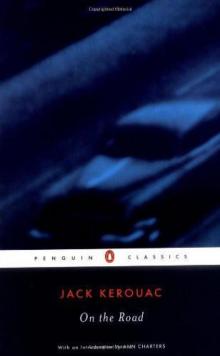 On the Road
On the Road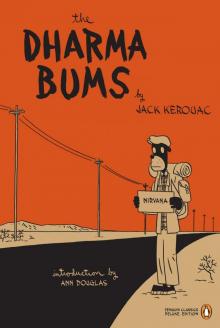 The Dharma Bums
The Dharma Bums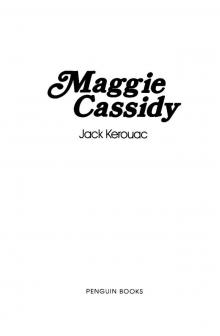 Maggie Cassidy
Maggie Cassidy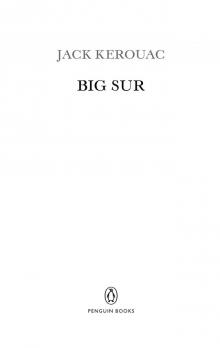 Big Sur
Big Sur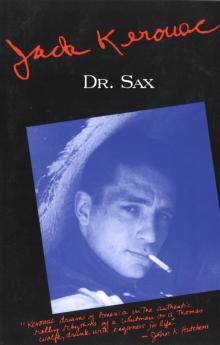 Dr. Sax
Dr. Sax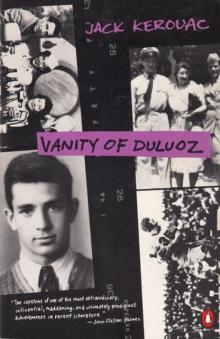 Vanity of Duluoz: An Adventurous Education, 1935-46
Vanity of Duluoz: An Adventurous Education, 1935-46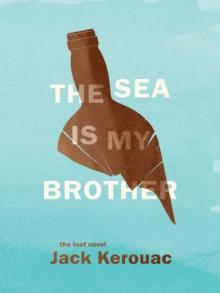 The Sea Is My Brother
The Sea Is My Brother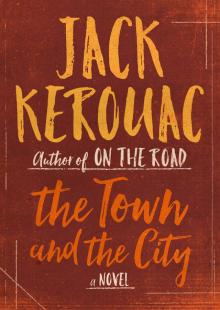 The Town and the City: A Novel
The Town and the City: A Novel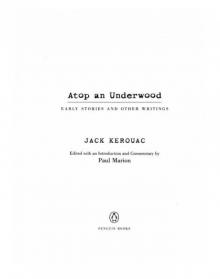 Atop an Underwood: Early Stories and Other Writings
Atop an Underwood: Early Stories and Other Writings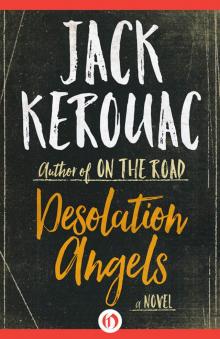 Desolation Angels: A Novel
Desolation Angels: A Novel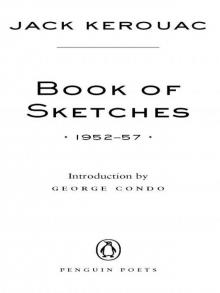 Book of Sketches
Book of Sketches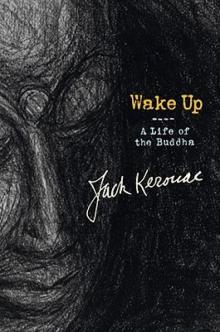 Wake Up: A Life of the Buddha
Wake Up: A Life of the Buddha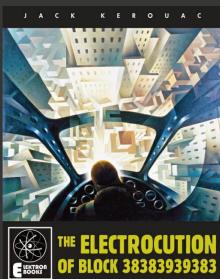 The Electrocution of Block 38383939383
The Electrocution of Block 38383939383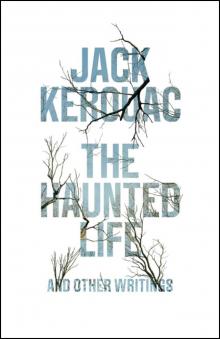 Haunted Life
Haunted Life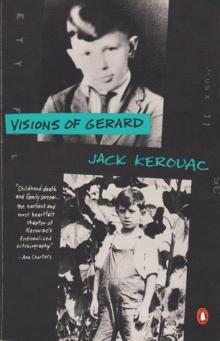 Visions of Gerard
Visions of Gerard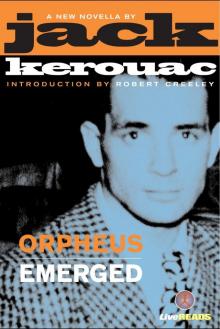 Orpheus Emerged
Orpheus Emerged Book of Blues
Book of Blues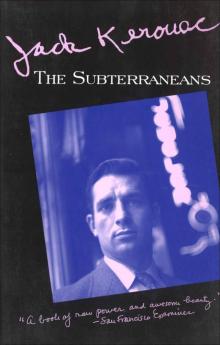 The Subterraneans
The Subterraneans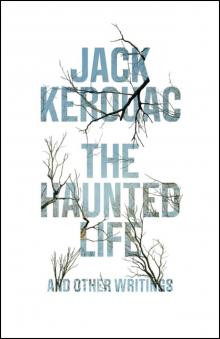 The Haunted Life
The Haunted Life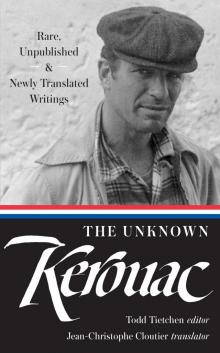 The Unknown Kerouac
The Unknown Kerouac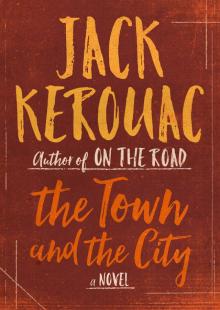 The Town and the City
The Town and the City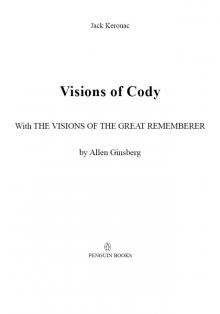 Visions of Cody
Visions of Cody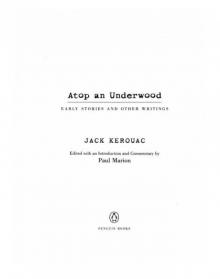 Atop an Underwood
Atop an Underwood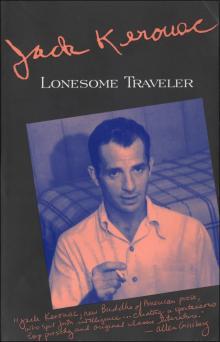 Lonesome Traveler
Lonesome Traveler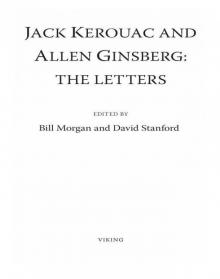 Jack Kerouac and Allen Ginsberg
Jack Kerouac and Allen Ginsberg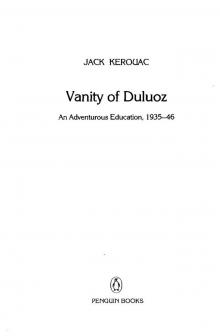 Vanity of Duluoz
Vanity of Duluoz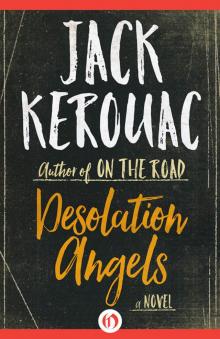 Desolation Angels
Desolation Angels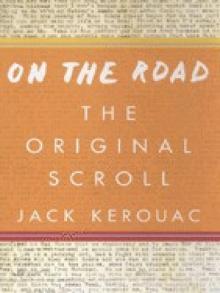 On the Road: The Original Scroll: (Penguin Classics Deluxe Edition)
On the Road: The Original Scroll: (Penguin Classics Deluxe Edition)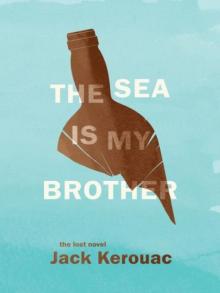 The Sea Is My Brother: The Lost Novel
The Sea Is My Brother: The Lost Novel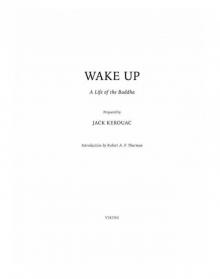 Wake Up
Wake Up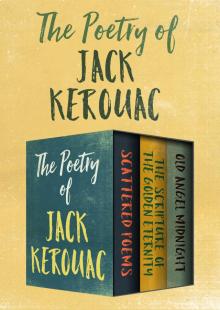 The Poetry of Jack Kerouac
The Poetry of Jack Kerouac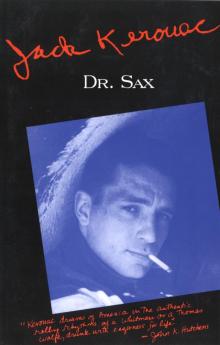 Doctor Sax
Doctor Sax